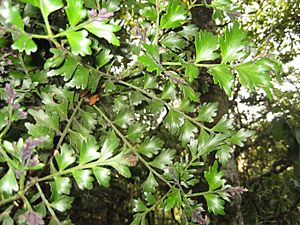Tanekaha facts for kids
Quick facts for kids Tanekaha |
|
|---|---|
 |
|
| Conservation status | |
| Scientific classification |
|
| Kingdom: | Plantae |
| Clade: | Tracheophytes |
| Division: | Pinophyta |
| Class: | Pinopsida |
| Order: | Pinales |
| Family: | Podocarpaceae |
| Genus: | Phyllocladus |
| Species: |
P. trichomanoides
|
| Binomial name | |
| Phyllocladus trichomanoides D.Don
|
|
| Script error: The function "autoWithCaption" does not exist. | |
Script error: No such module "Check for conflicting parameters".
The tanekaha (say: tah-neh-KAH-hah), also known as the celery pine, is a special type of conifer tree. It grows naturally only in New Zealand. Its scientific name is Phyllocladus trichomanoides.
Contents
What Tanekaha Looks Like
The tanekaha is a medium-sized forest tree. It can grow up to 25 meters (about 82 feet) tall. Its trunk can become as wide as 1 meter (about 3 feet).
Branches and Leaves
When the main branches first grow, they are green. After about 2 to 3 years, their bark gets thicker and turns brown. The real leaves of the tanekaha are very small. They look like tiny scales, only 2 to 3 millimeters long. These tiny leaves are green for only a short time before they turn brown.
Most of the tree's food-making process, called photosynthesis, happens in special parts. These parts are called phylloclades (say: FIL-oh-klayds). Phylloclades are like flattened, leaf-shaped branches. They are arranged one after another on a shoot. Each phylloclade is shaped like a diamond and is about 1.5 to 2.5 centimeters long.
Cones and Seeds
The tanekaha tree produces small seed cones. These cones look a bit like berries. Inside, there is a single seed. The seed is partly covered by a soft, white, fleshy part called an aril (say: AIR-il).
Where Tanekaha Grows
The tanekaha tree is found in different parts of New Zealand.
North Island
In the North Island, you can find this tree in lowland forests. It grows from an area called Te Paki down to about 40°S latitude.
South Island
In the South Island, the tanekaha grows in the northern parts. This includes areas like Marlborough and Nelson. It can be found down to about 41°30'S latitude.
How People Use Tanekaha
The tanekaha tree has been useful to people for a long time.
Strong Timber
Just like the kauri tree, tanekaha trees naturally drop their lower branches. This helps the main trunk grow straight and smooth. The timber (wood) from tanekaha is very strong. Because it has few knots, it is highly valued for building and other uses.
Natural Dye
The bark of the tanekaha tree is rich in a substance called tannin. The Māori (the native people of New Zealand) used this tannin. They extracted a red dye from the bark. This dye was used for coloring fabrics and other materials.
See also
 In Spanish: Tanekaha para niños
In Spanish: Tanekaha para niños


